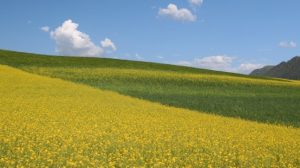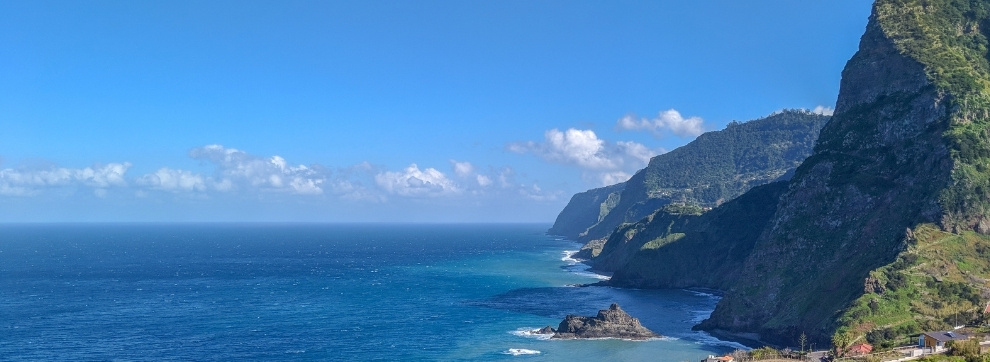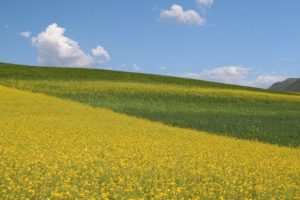In the midst of increasing natural disasters, famine, floods, global disease and ongoing wars, there is an inherent fear, uncertainty, and many, many questions about the state of the world today. Is this a punishment from Allah upon the world for the many transgressions? Are we to blame? What about the innocents? Is there no way back?
Events like these reveal or affect our perceptions of Allah. This is why it is even more crucial to get to know God and reflect upon His attributes. If we find ourselves despairing from the mercy of God, we should remember that Allah tells us in a hadith Qudsi (sacred hadith):
“I am as my servant expects me” [Bukhari]
If you believe that Allah is not merciful or wise, all you will find in the world is harshness and senselessness. But when you know that God is the Most Merciful, the Most Wise, and the Most Just, that should change the way we view any trial or tribulation. The Prophet ﷺ (peace be upon him) reminds us in a hadith (saying of the Prophet Muhammad ﷺ):
“Wondrous is the affair of the believer for there is good for him in every matter and this is not the case with anyone except the believer. If he is happy, then he thanks Allah and thus there is good for him, and if he is harmed, then he shows patience and thus there is good for him.” [Sahih Muslim]
God has decreed good in everything, even in what appears to harm us, if we show patience.
Tribulations in the Qur’an
Allah explains to us the meanings of different hardships in the Qur’an. He says,
“And We tested them with good and bad that perhaps they would return.” [Qur’an, 7:168]
“Do they not see that they are tried every year once or twice but then they do not repent nor do they remember?” [Qur’an 9:126]
“And We test you with evil and with good as trial…” [Qur’an, 21:35]
“Corruption has appeared throughout the land and sea by [reason of] what the hands of people have earned so He may let them taste part of [the consequence of] what they have done that perhaps they will return [to righteousness].” [Qur’an 30:41]
“And we will surely let them taste the nearer punishment short of the greater punishment that perhaps they will return[repent].” [Quran, 32:21]
“And We showed them not a sign except that it was greater than its sister, and We seized them with affliction that perhaps they might return [to faith].” [Qur’an, 43:48]
“[He] who created death and life to test you [as to] which of you is best in deed…” [Surat al-Mulk, 67:2]
Some hardships could be punishments. Others are tests. Others uncover hidden blessings (such as in Surat al-Kahf, which we will discuss). Sometimes it is a combination of all three, and other reasons we may not be aware of, too.
The ultimate reason for hardship is not something that any human being can say for sure. We can speculate in order to reflect on our personal actions and change what needs to be changed. But that is about it. The true reason is in the knowledge of God.
Yet, the spiritual effect of a hardship on us, though, should not be speculative. Regardless of what the true cause of a hardship is, we see a pattern. Throughout the Qur’an, Allah allows people to be exposed to these hardships so that they and we may return, as well as in order to show who of us will be best in deeds.
The truth is, there may be a different purpose for each individual. Here we will focus on how we should conceptualize hardships and the actions that we can take.
Punishment? And Return(ing) to Allah
Time and time again, Allah tells us that one of the reasons that we are exposed to hardships, trials, and the “lesser punishment” is so that we can return to Him.
We tend to interpret punishments in this world as though they are the final judgment – that the punishment brands us as eternally unworthy or bad or evil. And this is why we may become resentful or despair when someone suggests that a hardship could be a punishment. If it is indeed a punishment – it may not be – the fact that you are alive means that it is not the final judgment; far from it. Every new day is an opportunity for good deeds. If Allah gave you life it is in order to increase in your good deeds. The punishment is simply a consequence of the bad action, to alert us as well as to purify us, and the punishment comes from the Most Merciful and the Most Wise; this means that there is a purpose. He is also al-Halīm (the Forbearing), meaning that He is not hasty in His punishment nor rash. If what is happening is indeed a punishment, it did not come out of nowhere. But it is far from a final judgment; rather it is a wake-up call.
Allah wants us to reflect on our actions and return to Him, as He states so many times in the Qur’an. Without this hardship, many of us may have continued being heedless. It is ultimately a mercy because reacting with patience and returning to Allah raises our station, and by the grace of God averts the greater punishment on the Day of Judgment.
So what does returning to Allah look like? If we know that we are doing something that we should not, it looks like trying to leave that sin and seeking forgiveness. It looks like making more time for devotional acts. It looks like being kinder towards others. It looks like still turning to God in hope even after we have faced a calamity.
One of the reasons why a tribulation being described as a punishment makes some despair is because some people are already truly doing what they can. If this describes you, maybe the hardship is not a punishment at all. Perhaps it is something else.
There is another purpose.
Hardships and Tests: Perseverance and Forgiveness
Allah says that we are tested with both good and bad. Part of the purpose is returning to Him, and it is also for raising our station. The Prophet ﷺ said,
“Nothing afflicts a Muslim of hardship, nor illness, nor anxiety, nor sorrow, nor harm, nor distress, nor even the pricking of a thorn, but that Allah will expiate his sins by it.” [Bukhari/Muslim]
Any discomfort that is met by patience and turning to Allah results in expiation of sins. A person who is faced with such trials may even meet Allah with no sin at all. The Prophet ﷺ said, “When Allah loves a servant, He tests him,” [Tirmidhi]. Why? Tests mean a forgiveness of sin, and of the person turning to Allah more. The Prophet ﷺ also reminds us:
“I am amazed by the believer. If he is granted goodness, he praises Allah and is grateful. If he is afflicted with a calamity, he praises Allah and is patient. The believer is rewarded for every matter, even lifting a morsel of food to his wife’s mouth.” [Musnad Ahmad]
Moreover, when we are in difficulty, we are reminded to turn to Him and call to Him with all our heart. Indeed, trials remind us of our need for Allah, causing us to turn to Him with utmost sincerity. They remind us of ultimately who is in control, of the temporary nature of this world, and working for the hereafter. Thus, if we find ourselves hard hit by this tribulation, we should know that Allah is with us throughout this struggle. We should talk to Him, telling Him our fears and our hopes, and asking for His mercy.
The Best Deeds
Another reason is to see who will be doing the best deeds. Does hardship bring out the worst in us? Do we lose hope, hoard, and only look out for ourselves? Or are we hopeful in God, generous in giving, and actively look for those who need help so that we can be there for them?
The truth is, this global situation is affecting each of us in very different ways. Some may be suffering economically and maybe lost their jobs; others may be stuck in accommodation with someone abusive. On the other end of the spectrum, some may have only had to make simple lifestyle changes. So the “best deeds” look different in each situation. If you are particularly affected, the “best deeds” may be taking care of your family, or continuing to go to work if your field requires it. For those who are minimally impacted, the best deeds may be to provide relief for those who are truly suffering. The Prophet ﷺ tells us:
“The most beloved people to Allah are those who are most beneficial to the people.” [Sahih]
He ﷺ also said,
“Whoever walks with his brother regarding a need until he secures it for him, then Allah the Exalted will make his footing firm across the bridge on the day when the footings are shaken”. [Sahih]
The question remains: who will we be in this crisis?
Averting greater hardships
In Surat al-Kahf, we are told the story of al-Khidr damaging the boat, as well as the death of the child of two righteous people. What appears to be a “bad thing happening to good people”, we later discover, actually averted a greater calamity. For the people of the boat, it averted having their boat completely taken from them by a tyrant king, who only wanted boats in a good condition. This is something that is not discovered until later on, even though in the moment, the people must have been dismayed. As for the parents whose child died, this is probably the most devastating thing that can happen to a parent. But Allah tells us that it averted the greater calamity for these two good people: that of seeing their child become an oppressor. This blessing and wisdom in this situation will not be seen until the Day of Judgment, where they will ultimately be reunited with their child in Paradise.
Collectively, maybe the lowering of pollution levels due to the quarantines will help to avert or delay a greater environmental calamity hitting. Maybe governments that did not believe in providing basic necessities for people will rethink their policies. Individually, perhaps losing our job will open the door to a better one. Perhaps being forced to stay with family whom we do not have a good relationship with force us to make amends. Perhaps the perseverance and faith we exhibit during these trying times are what make us of the people of Paradise. These could all be part of the purpose, but we will not know until later, and until actually going through the hardship.
May we be of those who face hardship with patience and gratitude, who react to punishment and tests by returning to Allah and making amends, and those who receive the bounty and love of the Most Merciful.
Proudly brought to you by Virtual Mosque, more can be found here.















